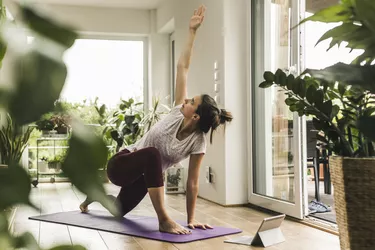If you weren't able to prioritize your self-care and personal well-being this past year, you're not alone. Thinking globally and taking care of the needs of others is a necessary response during a pandemic. Even so, there are reasons why bringing your own needs to the forefront should be on your to-do list for the new year.
Directing focus to your physical health and mental well-being isn't a selfish deed; it's an act of self-love that helps you take better care of yourself, even while you continue to help others in your life. It can counteract burnout by lowering stress, increasing energy and boosting that resiliency you've relied on so often over the past two years.
Video of the Day
Video of the Day
There are simple ways to do this in 2022.
1. Top of the List: You
To kickstart your self-care, you really do have to be at the top of the list. Even if helping and pleasing others is what makes you most happy, getting your feelings and thoughts in the spotlight is an essential step.
There is a good chance you'll have to schedule it in to make sure it happens. University of Alabama Medicine recommends scheduling in any amount of time you can for these important rituals.
Use this as an opportunity to set boundaries and set aside the time you need for you and your self-care routine. Acknowledge your needs and create space for self-discovery and renewal. Be sure to check in with yourself on a daily basis as a reminder that your feelings and thoughts continue to deserve your attention and time.
Consider also: Let These Practices Help You Throughout Your Day
2. Savor the Positive
Entering the second year of a pandemic might be one of the best times in recent history to focus on savoring the positive. This mental health boost goes deeper than "looking on the bright side."
Savoring is defined in psychology circles as "attending, appreciating and enhancing" the good things that happen in our lives. It's like taking a good experience and looking at it closely, turning it around in our hands and feeling that goodness exponentially.
You can savor things that happen in the past, present or future. You can savor something in the moment or look back at it at the end of the day. You can also share it with a friend or write it in a journal. However you do it, savoring is a form of self-care because it helps amplify positivity and counterbalance stress.
3. Practice Tiny Meditations
Meditation is a front-runner for me-time and dissolving the stress of everyday life. If finding enough alone time to meditate for an hour is giving you stress, there are ways to reap the mental and physical health benefits in far less time. Tiny meditations can be practiced anywhere: in bed, in the shower, in line, at a meeting or at a stoplight.
For example, doing a slow, mindful body scan can be done wherever you are: Center your thoughts on your breath, search your body for tension and gently soften where you feel tight. Inhale slowly and deeply, up to a count of six and then exhale just as slowly. Spend as much time as you have at the moment and repeat throughout the day.
If you can put on your headphones and listen to a short, guided meditation or podcast on a daily basis, you'll be surprised at how great that feels. Any time for meditation is enough time.
Consider also: What Is the Best Relaxation App?
4. A Health and Wellness Buddy
There's proven science behind why an exercise companion keeps us more motivated to do physical activity. The companionship makes us get moving more often and for a longer period of time. This is true for your self-care routine too. Committing to personal development and well-being is even more fun and beneficial with a buddy.
Make a priority list together and find out which goals are shared and which are personal. Some ideas might include getting enough sleep, spending less time on social media and engaging in regular, moderate physical activity.
It will help you stay on track but remember: this isn't about being held accountable; it's about giving your self-care a new dimension by involving a friend.
Consider also: Why Buying Exercise Equipment Doesn't Make You Exercise
Start Your 2022 Self-Care Journey
These are some of the simple ways to help weave self-care into your busy life. Taking even a small amount of time and dedicating it to your health and well-being will have a positive impact on your new year.
- National Institute of Mental Health (NIMH): Caring for Your Mental Health
- Mayo Clinic: COVID-19 and Your Mental Health
- University of Washington: 'Self-care and Resilience'
- American Psychological Association (APA): Teaching Self-Care to Caregivers
- NIMH: 8 Things to Know About Meditation for Health
- National Library of Medicine (NIH): Stress, savouring, and coping: The role of savouring in psychological adjustment following a stressful life event
- Centers for Disease Control and Prevention (CDC): How Much Physical Activity Do Adults Need?
- Science Daily: A New Exercise Partner Is the Key to Exercising More
- University of Colorado Health: How to Practice Emotional Self-Care
- APA: The American Workforce Faces Compounding Pressures
